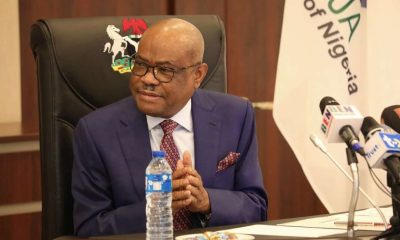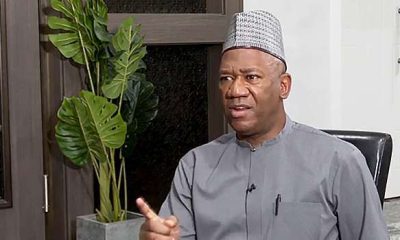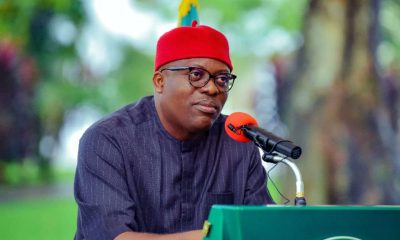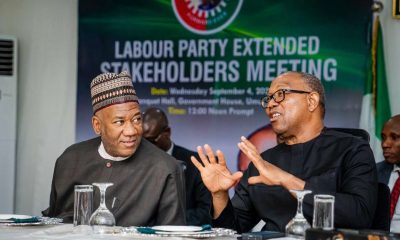Headlines
2023: Atiku seeks Northern solidarity

By OBINNA EZUGWU
But for the emergence of Peter Obi, presidential candidate of the Labour Party, the 2023 presidential election could have fairly been called for Atiku Abubakar, Nigeria’s former vice president and candidate of the People’s Democratic Party (PDP), who in 2019, lost to President Muhammadu Buhari, in an election whose outcome, many insist, did not reflect true wishes of the people.
“In 2019, Atiku lost his best chance to massive rigging. I’m one of the few people who believed Atiku defeated Buhari in 2019. In key Northern states, Buhari’s votes were increased and Atiku’s votes reduced by corrupt INEC officials in concert with APC govs, police and SSS,” noted Jaafar Jaafar, journalist and publisher of Daily Nigerian.
“In Kano, Buhari’s actual votes were about 1.1 million, but increased to nearly 1.5m. In Katsina, his actual votes were around 800,000 but 400,000 votes were criminally added. Similar electoral heists occurred in Borno, Yobe, Kaduna, etc.”
In the 2019 polls whose outcome Atiku contested all the way to the Supreme Court, the former vice president won plurality votes in the Southeast and the South South, while also polling good numbers in the Southwest, but was ultimately undone by the high numbers Buhari got across the north.
However, in 2023, the former vice president, no longer facing an incumbent, could easily have been home and dry, had his southern political base remained intact, given that he has reasonable assurance of doing much better in the north than he did in 2019, facing, this time, a southerner in Bola Tinubu of the ruling All Progressives Congress (APC) whose ticket is further hobbled by the decision to field same faith ticket.
The political equation has changed radically from what it was in 2019 when it was widely accepted that power ought to remain in the north, and thus no serious southern contender featured in what was essentially, Atiku versus Buhari contest. This time, the predominant sentiment favours power shift to south, the north having taken eight years, and Atiku is somewhat swimming against the tide.
Unlike 2019 when it was about two northern candidates sharing votes in the south, the region now has two strong contenders in Tinubu from the Southwest, and Mr. Peter Obi, from the Southeast, who was Atiku’s running mate in 2023.
This time, Obi, former governor of Anambra State, is on the ballot as a contender, and has since becoming candidate of Labour Party, a small platform compared to the two behemoths in the APC and the PDP, shaken the country’s political landscape.
Though initially dismissed as a social media bubble that would eventually burst, Obi has continued to prove doubters wrong, beating both Atiku and Tinubu in one opinion poll after another, and is poised to, in the very least, balkanize PDP votes in its traditional strongholds of the South, namely, the Southeast and South South.
Yet, Obi, the only Christian among the four leading contenders – the fourth being Rabiu Musa Kwankwaso, candidate of the New Nigeria People’s Party (NNPP) – is also widely popular in the North Central, and is sure to further diminish what could have been Atiku’s votes in the region.
The former vice president’s headache in the south is further worsened by the intractable crisis in his party which began following his decision to pick Dr. Ifeanyi Okowa, Delta State governor, as his running mate, instead of Nyesom Wike, governor of Rivers, who had the backing of most of the party’s governors and other stakeholders, and which has pitted him against the, Rivers governor.
Wike with his PDP clique, now known as G5, including Samuel Ortom, governor of Benue; Okezie Ikpeazu, governor of Abia State; Seyi Makinde, governor of Oyo State, and Ifeanyi Ugwuanyi, governor of Enugu State, has withdrawn support for the former vice president, insisting on the resignation of Senator Iyorchia Ayu as national chairman of the party, a development that has left the party divided, and Atiku without a stronghold, and in need of new friends.
And aware of the odds, Atiku has upped his game in the North, determined to take the region from the APC, the platform through which Buhari, from Katsina, Northwest, swept votes in 2015 and 2019, but which now has southerner, Tinubu from Lagos, southwest, as candidate.
At an interactive session organised by the Northern Elders Forum at the Arewa House in Kaduna recently, the former vice president pointedly argued that the North needed a northerner who also understands other regions as president, and not Igbo or Yoruba candidate.
“Obviously, given what is happening in the PDP with Wike and his group, and considering the Peter Obi factor, Atiku must win by good margin in the north to stand a chance in 2023, said Chidi Anthony, lawyer and political analyst. “Anything short of outright victory in most of the core northern states, he is done.”
Atiku has begun to make intensive effort to win the support of stakeholders in the region. Within the past one week, he has visited or held rallies in Bauchi, Borno, Jigawa, Niger, among other northern states.
After flagging off his campaign in Maiduguri, Borno, the home state of Kashim Shettima, APC vice presidential candidate, he proceeded to Bauchi to honour the coronation of Dr. Umar Farouq as the 12th Emir of Katagum, and subsequently went to Jigawa State where he paid a visit to the Emir of Hadejia, Dr. Adamu Abubakar Maje, and the Emir of Dutse, HRH Alhaji Nuhu Mohammed Sanusi, over the recent floods in the state.
Atiku, at the weekend, also visited Ibrahim Babangida, the influential former military president in Minna, Niger State.
The visit to Minna particularly came amid speculations that he’s mounting pressure on Kwankwaso, the NNPP candidate and former governor of Kano, to step down for him, so that he would be the only northerner on the ballot, facing two southern contenders.
Indeed, reports have emerged that some Northern leaders, particularly the Northern Elders Forum, having allegedly adopted the former vice president as their consensus candidate, are moving to ensure that the region presents one candidate in 2023, and have been pressuring Kwankwaso to step down.
It is instructive to recall, too, that Kwankwaso had snubbed an invitation by the northern elders to speak at their interactive forum last month, alleging that the elders had already adopted Atiku as their preferred candidate.
In a report last week, New Telegraph quoted sources in the north to have confirmed in separate conversations that many leaders in the region want Atiku as consensus candidate.
“Our people have resolved to adopt a consensus candidate for 2023, and the person they have chosen is former Vice President Atiku Abubakar, the PDP candidate,” one of the sources said.
Regardless, Kwankwaso is said to have remained unyielding, and had at the weekend, restated his resolve not to step down for anyone, which may have prompted the former vice president’s visit to Minna.
“Madugu (Kwankwaso’s sobriquet) is being called and visited by prominent leaders in the North to drop his bid for Waziri, but he has refused to accept, a sources close to the NNPP candidate said.
Kwankwaso, who is from the Northwest, same zone as Buhari, has no moral claims to power in 2023, but Atiku’s northeast, which has not produced a president since Tafawa Balewa, the first Prime Minister, is somewhat justifiably seeking a chance to govern.
Atiku is perhaps more likely to attract votes in the north than Tinubu, even though the APC controls vast majority of the states in the region, as regional sentiments are likely to come into play, and in the unlikely event that Kwankwaso steps down for the former vice president, his chances of winning the region by reasonable margin would further widen, which would by implication, boost his chances of becoming president.
“To beat Tinubu and Obi in 2023, Atiku ought to flip the north,” said Anthony, “while hoping that his party’s leaders in the south do enough to limit the damage Peter Obi is poised to do.”












